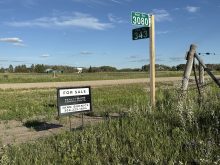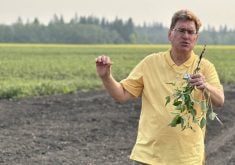An investigation into a tuberculosis-ridden cattle herd in southwestern Manitoba has ended with no more cattle being killed beyond the original 125 animals.
And so far, no new diseased animals have turned up, according to Terry Whiting, a disease control veterinarian with the Canadian Food Inspection Agency.
Tuberculosis showed up three months ago in routine autopsies done at a United States slaughter plant.
The infected cattle were traced to a herd in Rossburn, Man.
Federal food safety inspectors tested more than 2,500 cows in the area. That’s nearly all herds within a six kilometre radius of the infected herd. None of the cattle tested positive in the skin test, Whiting said.
Read Also

Key actions identified to address canola tariffs
Federal and Saskatchewan governments discuss next steps with industry on Chinese tariffs
The department’s investigation is now centred on tracing all cattle that left the infected herd since 1990, starting with animals sold last year.
“We’re trying to make sure no heifer calves from this herd were recruited into other breeding herds in the last five years,” Whiting said.
“The producer was a production farmer so he kept the good ones to himself, likely still on the farm. The ones he wouldn’t have kept are less likely someone would pick them out of a feeder pen for heifer replacement but we have to eliminate that possibility.”
The news of the outbreak came as a bitter blow to the farming community and federal officials with the Canadian Food Inspection Agency in charge of reportable diseases.
In 1991, the rare disease flared up in a nearby Rossburn-area herd causing 1,000 animals to be destroyed.
Mycobacterium bovis, cattle tuberculosis, is a contagious disease characterized by small round lumps or lesions in organs and body cavities. Commonly transmitted through coughing, it can be spread from livestock to humans and other warm-blooded animals.
Compensation is farmgate market value on the day the animals are ordered destroyed, to a maximum of $1,500 for a beef cow.
Officials at Riding Mountain National Park have tested about 100 elk and moose with no sign of TB.
















